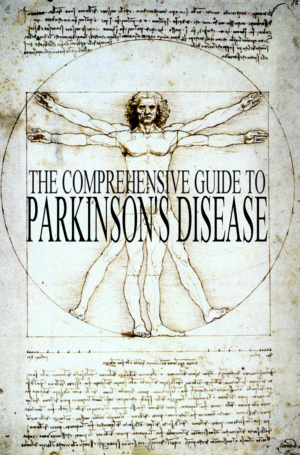|
MOST PREVALENT SYMPTOMS
Earlier
Parkinson's Disease
The most
common symptoms in earlier Parkinson's Disease are rigidity (stiffness), tremor,
bradkynesia (slowness of movement), freezing, falling, microphagia (reduced
handwriting size), reduced arm swing, mirror movements, dysarthria (speech
difficulties), hypomimia (reduced facial expression), depression, apathy,
fatigue, anxiety, pain, sleep disturbance, constipation, dysphagia (swallowing
difficulty), urinary symptoms, cardiovascular symptoms, respiratory muscle
dysfunction, anosmia (reduced sense of smell), and sexual dysfunction. The
perception in patients of which symptoms are the most troublesome often differ
from the clinicians view. In earlier Parkinson's Disease, the five most
prevalent complaints ranked in descending order were : slowness, tremor,
stiffness, pain, and then loss of smell or taste.
Advanced
Parkinson's Disease
Some symptoms
become far more common as Parkinson's Disease worsens. The most prevalent of
these are hypokinesia, bradykinesia (slowness of movement), akinesia,
dyskinesia, dementia, excessive daytime sleepiness, and siallhorea (drooling).
In advanced Parkinson's Disease the five most prevalent complaints ranked in
descending order were : fluctuating response to medication (most commonly
wearing off, followed by dyskinesia), mood changes, drooling, sleep problems
(most commonly middle and late night insomnia followed by daytime sleepiness),
and then tremor.
MUSCULAR SYSTEM
In
Parkinson's Disease there are symptoms that can affect the muscles generally.
These can include rigidity, tremor, hypokinesia (reduced movement), bradykinesia
(slowness of movement), akinesia (loss of movement), dyskinesia (abnormal
involuntary movements), akathisia (motor restlessness), and dystonia (abnormal
involuntary postures).
Those
muscular symptoms that can specifically affect the lower limbs are : shuffling
(when walking), freezing (feeling unable to walk forwards), festination,
falling, and restless legs syndrome.
Those muscular symptoms
that can specifically affect the upper limbs are : impaired finger
dexterity, micrographia (small handwriting), reduced arm swing, mirror
movement, and frozen shoulder syndrome.
Those muscular symptoms
that can specifically affect the head and neck are hypomimia (reduced facial
expression), reduced blinking, dysarthria (difficulty speaking), and neck
rigidity.
The most
common symptoms of these in Parkinson's Disease are rigidity (stiffness),
tremor, bradkynesia (slowness of movement), freezing, falling, microphagia
(reduced handwriting size), reduced arm swing, mirror movements, dysarthria
(speech difficulties), and hypomimia (reduced facial expression).
NERVOUS SYSTEM
In
Parkinson's Disease there can be an increased likelihood of depression,
dementia, pain, sleep disturbance, excessive daytime sleepiness, fatigue,
apathy, anhedonia, bradyphrenia, alexithymia, anxiety, hallucinations,
compulsions, neuropathy, and vertigo. The most prominent and prevalent of
these symptoms are depression, apathy, fatigue, anxiety, pain, sleep
disturbance and dementia (in more severe Parkinson's Disease).
ALIMENTARY SYSTEM
In
Parkinson's Disease there can be an increased likelihood of constipation,
dysphagia (swallowing difficulty), sialorrhea (excessive saliva and
drooling), obesity, gastroparesis (slow gastric emptying), and intestinal
bacterial overgrowth. The most common symptoms of these in Parkinson's
Disease are constipation, which occurs in most people, followed by
dysphagia, then sialorrhea, both of which occur in a large minority of
people.
URINARY SYSTEM
In
Parkinson's Disease there is often nocturia (frequent urinating at night),
urinary incontinence (loss of urinary control), increased urinary frequency,
and urinary retention (an inability to completely empty the bladder).
Urinary symptoms occur in between 27% and 85% of people with Parkinson's
Disease.
CARDIOVASCULAR SYSTEM
Cardiovascular dystautonomia usually
occurs in Parkinson's Disease and can include a variety of cardiovascular
symptoms. Certain Parkinson's Disease drugs can increase the likelihood of
heart failure, in which breathlessness, feeling very tired and ankle
swelling are the main symptoms. Cardiovascular symptoms occur in 70% of
people with Parkinson's Disease.
RESPIRATORY SYSTEM
Respiratory muscle dysfunction usually, but not always, occurs in
Parkinson's Disease. Respiratory muscle dysfunction makes respiratory
diseases such as pneumonia more dangerous due to the reduced respiratory
capacity it causes.
SKELETAL SYSTEM
In
Parkinson's Disease there can be an increased likelihood of osteoporosis and
osteopenia. Postural deformities can be frequent and disabling complications
of Parkinson's Disease. The postural deformities can include scoliosis, Pisa
syndrome, and camptocormia.
INTEGUMENTARY SYSTEM
In Parkinson's Disease there is an
increased likelihood of melanoma, which is a form of skin cancer; seborrhea,
which is increased sebum secretion; and hyperhidrosis, which is increased
sweat secretion. Increased sweat secretion is usually due to Parkinson's
Disease drugs.
SENSORY
SYSTEM
In
Parkinson's Disease there can be an increased likelihood of anosmia (which
is a loss of the sense of smell), rhinorrhea (which is nasal discharge),
visual disturbance, retinal thinning, hypogeusia (which is impaired sense of
taste, and hearing loss. Visual disturbances and anosmia (loss of sense of
smell) are particularly prominent in Parkinson's Disease. Most people with
Parkinson's Disease have a loss of the sense of smell (anosmia) or reduction
in the sense of smell (hyposmia).
ENDOCRINE SYSTEM
In
Parkinson's Disease there is an increased likelihood of hyperprolactinemia
in the pituitary gland, blunted circadian rhythms in the pineal gland,
catecholamine deficiency in the adrenal gland, and hypothyroidism in the
thyroid gland. Hypothyroidism is not a Parkinson's Disease symptom but can
often coincide with Parkinson's Disease.
REPRODUCTIVE SYSTEM
Parkinson's Disease can cause sexual
dysfunction in men and women. Sexual dysfunction is common in Parkinson's
Disease, with over 40% of people with Parkinson's Disease being affected in
this way. Over two thirds of people with Parkinson's Disease had decreased
sexual activity. Nearly two thirds of people with Parkinson's Disease had a
loss of sex drive.
IMMUNE SYSTEM
Neuroinflammation commonly, but not
always, occurs in Parkinson's Disease. There is a greater likelihood of CNS
infections occurring in Parkinson's Disease after diagnosis, and also before
being diagnosed with Parkinson's Disease.
 |
THE
COMPREHENSIVE GUIDE TO PARKINSON'S DISEASE
Keith Bridgeman, Tahira Arsham
The Comprehensive
Guide to Parkinson's Disease, which is fully referenced, and nearly
800 pages long, is the most comprehensive book concerning
Parkinson's Disease ever written. It includes its history, famous
people with Parkinson's Disease, its complete biochemisty, cytology
and cytological effects, anatomy and anatomical effects, physiology
and physiological effects, symptoms (of every system in the body),
diagnosis methods (observational, technological, chemical),
biochemical causes, toxic causes, genetic causes, pharmacological
causes, medical causes, treatments (biochemical, pharmacological,
surgical, natural, exercise methods, technological methods),
organisations, web sites.
CLICK HERE FOR MORE DETAILS |
 |
.gif)
.gif)

